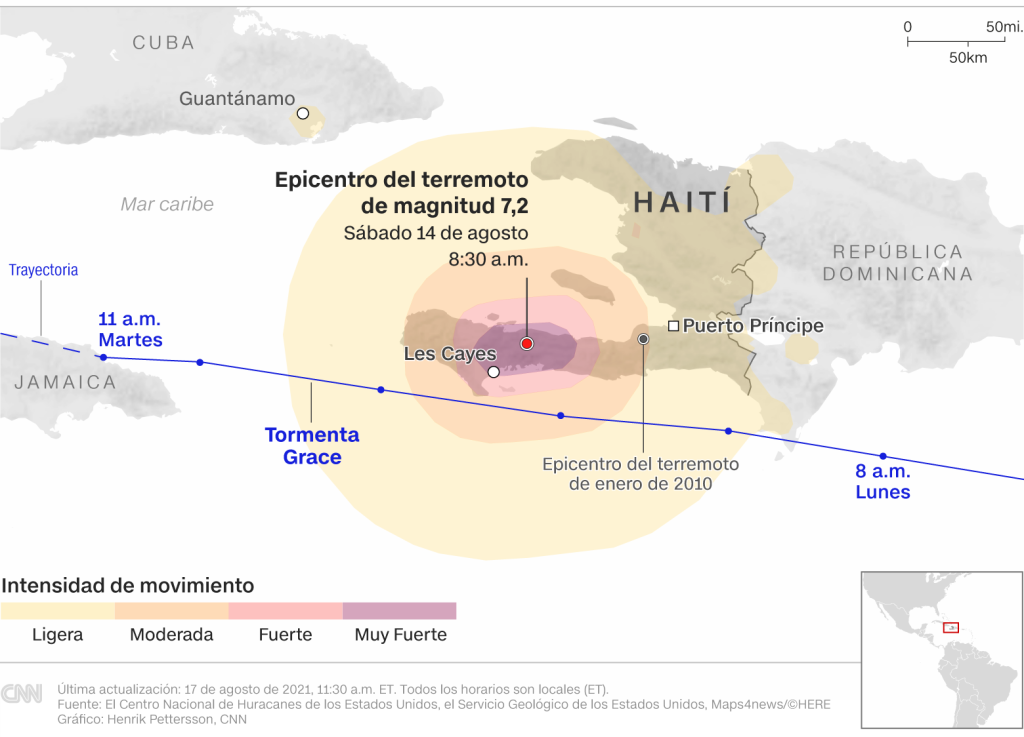This is how the streets of Haiti were left after 4:33 earthquake
(CNN) -
Haiti's hospitals are completely overwhelmed by survivors of Saturday's magnitude 7.2 earthquake and need urgent help to treat them, according to medical staff.
The earthquake, which shook the southwest of the country, left at least 1,941 dead and more than 9,900 injured.
That number is expected to increase, but search and rescue efforts are hampered by a lack of resources and heavy rains, which have caused landslides that have blocked roads in the region.
Haiti: people killed, injured and affected by the earthquake on Saturday, August 14
The humanitarian crisis created by the earthquake means that some 600,000 people are estimated to need assistance and that there is an urgent need for drinking water, especially in the Pestel commune, where almost all drinking water reservoirs were destroyed, said the Director of Protection. Haitian civilian, Dr. Claude Predtit, at a press conference this Wednesday.
At least 75,000 homes were damaged or destroyed by the tremors, affecting some 135,000 families, it said, adding that 34 people were rescued from the rubble on Tuesday and Wednesday.
At the main hospital in Jeremie, one of the hardest-hit cities, there were 84 people awaiting treatment at a facility that normally treats 10 people a day, CNN found during a visit Tuesday.
All the beds were full, and there were also patients lying on the floor.
Without evacuation to better-equipped facilities, at least a third of them could lose limbs or not survive, a doctor told CNN.
Hospitals can't keep up.
Jean Yves Dorvil himself pulled his 22-month-old daughter Evenson out of the rubble with a shattered femur.
advertising
"My daughter is suffering and I don't want her to lose her leg," Dorvil told CNN.
"I am very grateful to these doctors who work without help."
Other survivors had to fend for themselves, as Tropical Depression Grace caused torrential rains and strong winds in the same area affected by the earthquake.
With their houses destroyed, some tried to take shelter under makeshift tents and tarps.
"We sleep sitting on chairs," Theard Andrise revealed to Reuters.
"No one has come to help us."
Aid has poured into the capital, Port-au-Prince, but getting it to affected areas has been difficult due to landslides.
"I'm in a lot of pain. They promised us medicine. I went to get it and they told me to wait," Marimene Jouesil told Reuters.
"Yesterday they distributed aid but I could not get anything." We have nothing to eat, we have nothing.
The United States Coast Guard is one of the agencies on the ground to assist with recovery efforts.
On Tuesday, the U.S. Department of Defense announced that it had formed a joint task force to assist the U.S. Agency for International Development (USAID) in the relief effort, while the United Nations and the European Union allocated $ 8 million and $ 3.5 million, respectively, in aid to Haiti.
Following a request for assistance from Haiti's Department of Civil Protection, the Caribbean Disaster Emergency Management Agency (CDEMA) is preparing to deploy members of an operational support team to the country.
Haiti, still reeling from the assassination of its late President Jovenel Moïse in July, relies heavily on donor countries and organizations for its relief efforts.
The earthquake occurred at 8:30 am (local time) on Saturday, at a depth of approximately 10 kilometers;
its epicenter was located about 12 kilometers northeast of Saint-Louis-du-Sud, in the south-west of the country.
About 1.2 million people, including 540,000 children, have been affected by the earthquake, according to UNICEF, the UN agency for children.
The earthquake in Haiti affected more than 1.2 million people, according to Unicef
The agency said Wednesday that the earthquake, followed by Tropical Storm Grace on Monday, destroyed 94 of the 255 schools in the heavily affected southern administrative region within weeks of the start of the school year.
"Assessments have not yet been carried out in the departments of Nippes and Grand'Anse, as well as in other communities that have not yet been reached," the Unicef statement said.
UNICEF also estimates that US $ 15 million is needed "to respond to the most urgent needs of at least 385,000 people" affected by the earthquake over a period of eight weeks, according to the statement.
The earthquake is just the most recent challenge for the distressed island nation, which was devastated in 2010 by a magnitude 7.0 earthquake estimated to have killed between 220,000 and 300,000 people.
Why is Haiti suffering so much from earthquakes (and not the Dominican Republic)?
"Just over a decade later, Haiti is reeling again. And this catastrophe coincides with political instability, increased gang violence, alarming rates of malnutrition among children and the COVID-19 pandemic, for the that Haiti has received just 500,000 doses, despite needing many more, "Henrietta Fore, UNICEF Executive Director, said Monday.
"Now it is especially urgent to get vaccines to those affected by the earthquake."
CNN's Tara John and AnneClaire Stapleton contributed to this report.
GraceHaitiEarthquakes

